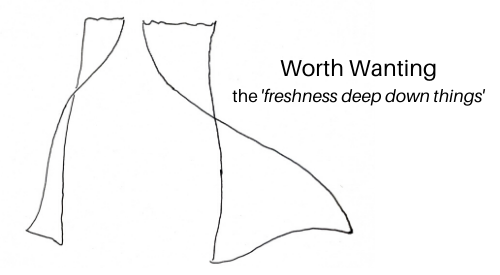
You may have gotten the impression that encounters are all about art appreciation, or exercise, or garden work as here, here, and here. All very personal and safe.
You would be mistaken however, because encounters aren’t precious or privileged. They happen in the midst of the hurly-burly of normal life as when we’re teaching, lending or guiding, or when we’re learning, designing, or wandering, or when we’re visiting, celebrating or reconciling. In short, whenever we’re making common cause with the livingness of any other, addressed as you, as we might any time in an ordinary day, we are encountering. See the stances of solidarity here. See types of others and othernesses here.
Our most common encounter opportunities involve other people we engage with for the sake of some business to transact or work to do . Yet, in the course of any interaction, we may each toggle between second person and third person regard of the other, but the former being the encounter portion of our time together.
Encounters are neither exotic nor rare. We regularly engage in them, not always recognizing them as such until we reflect on them, as I do sometimes in my posts. I’d write more about my daily encounters except that it’s hard to write about encounters with other people without compromising the trust upon which they depend. Hence art, birds, gardens.
It’s important to acknowledge that encounters are not always easy or comfortable. There are many rewards but also risks. The persist of existence of encounters is never at risk, but our experiences may not always be entirely happy or uplifting.
Betrayal, rejection, disappointment are possible in all human interactions, including the encounters we propose or accept. These are standard, albeit painful, risks.
But encountering as a practice has special risks. In our encounters, we each share a individual environment of others and othernesses that pertains to our behaviors and beliefs (our alterium). And the others in our alterium are often the focus of strong feelings. So, for instance, a stranger asking for hospitality surely has strong emotions about the system in which the need exists. Or a friend showing off an trophy may have intense feelings about its significance. Or a play director and a choreographer collaborating on a play may have powerful convictions about the right person for a particular role.
We don’t find indifference in our alteria but things to which are attached complex emotional responses, including intense suffering. To make common cause with the livingness of another is to expose oneself to these emotions. There may be things hard to grasp and feelings hard to appreciate in the alterium of an other. And we may be at a loss for response. So being exposed to the alterium of an other may not be an entirely comfortable experience.
And at the same time, we ourselves are invited in like manner to reveal ourselves. It’s not easy to share any meaningful things, much less the hard ones.
There’s a further risk. We may be challenged as we are confronted by an other’s others to change the contour, the components, the internal configurations of our own alteria, with consequences for our behaviors and beliefs that other people may observe. Our readiness to entertain change, our livingness, may, under these circumstances, be put to the test.
Perhaps the ultimate risk is more a challenge to faith. The point of any encounter is the advent into it of transcendent freshness. While encountering, we are responding to each other conversationally. After the encounter is over, we may ask: was freshness there? Did the transcendent breeze of beyondness really blow?
All transcendence has some promise of beyondness, some whiff of unexplored plenitudes, or unrealized potentialities, of unresolved puzzles, along with an implicit ‘Come and get me’ invitation. We respond with a ‘Ah, fresh air’ or ‘At last, I can breathe’ feeling. We sense the breeze behind the billow.
And it may be that new ideas, new options, new perspectives did occur or existing ones did take on new glamour, that beyondness turns out to have unsuspected and welcome resources for us.
Perhaps the hardest encounters involve feelings of grief, regret, shame and guilt. Freshness makes its presence known very, very gradually in such encounters. The promise of beyondness, however, is that some trans-grief, trans-regret, trans-shame, trans-guilt future is there to be found. Encounters are a way of looking.
So in our reflections on encounters, we discern the presence of freshness. “Didn’t our hearts glow?” More on reflecting here.
In our riskings, we experience others; in our reflectings, we discover freshness; and encountering is definitely not tame.
